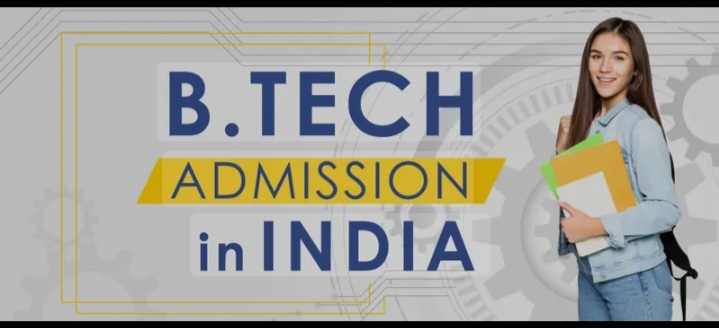B.Tech in Computer Science, Admission 2025-26, Couese,Fee,syllabus,Plasment

B.Tech in Computer Science
B.Tech in Computer Science (often B.Tech CSE) is a popular four-year undergraduate engineering degree. It focuses on the theoretical foundations of computer science and their application in designing, developing, and testing software and hardware. You'll dive deep into the world of algorithms, data structures, programming languages, computer networks, and operating systems, among other fascinating areas.
Eligibility & Admission
Typically, to get into a B.Tech CSE program in India, you'll need to have:
Completed 10+2 (or equivalent) from a recognized board.
Studied Physics, Chemistry, and Mathematics (PCM) as core subjects in 10+2.
Achieved a minimum aggregate percentage in 10+2, usually ranging from 50% to 60%, though this can be higher for premier institutions.
A valid score in a national-level entrance exam (like JEE Main, JEE Advanced) or state-level/university-specific entrance tests. Some private universities might offer direct admission based on 10+2 marks or have their own entrance exams.
What You'll Study
The curriculum is spread across eight semesters and covers a wide array of subjects. Core areas generally include:
Programming Languages: (C, C++, Java, Python, etc.)
Data Structures and Algorithms: The backbone of efficient software.
Operating Systems: Understanding how software interacts with hardware.
Database Management Systems (DBMS): Managing and organizing data.
Computer Networks: How computers communicate with each other.
Software Engineering: Principles of designing and developing software.
Theory of Computation: The fundamental capabilities and limitations of computers.
Computer Architecture: The design of computer systems.
Discrete Mathematics: Essential mathematical concepts for computer science.
Artificial Intelligence (AI) and Machine Learning (ML): Increasingly a core component, this field involves creating intelligent systems.
Web Technologies: Developing websites and web applications.
Cybersecurity: Protecting systems and data from threats.
Many programs also offer elective courses in emerging areas like Data Science, Cloud Computing, Internet of Things (IoT), Blockchain, etc., allowing you to specialize. Practical labs, projects, and sometimes internships are integral parts of the course.
Career Prospects
A B.Tech in Computer Science opens doors to a vast number of career opportunities across various sectors. Graduates are highly sought after in:
IT Companies: (Product-based and service-based)
Startups: Offering dynamic and innovative environments.
Consultancy Firms:
Research and Development Organizations:
Government Sector:
Banking and Finance: For developing financial software and security systems.
E-commerce:
Healthcare: For developing healthcare IT solutions.
Common Job Roles Include:
Software Developer/Engineer: Designing, coding, and testing software applications.
Full-Stack Developer: Working on both front-end (user interface) and back-end (server-side) development.
Data Scientist/Analyst: Analyzing complex data to derive insights.
Machine Learning Engineer: Developing AI and ML models.
Cybersecurity Analyst: Protecting systems from cyber threats.
Cloud Engineer: Working with cloud platforms like AWS, Azure, Google Cloud.
Database Administrator: Managing and maintaining databases.
Network Engineer: Designing and managing computer networks.
Web Developer: Creating and maintaining websites and web applications.
Game Developer: Designing and developing video games.
Systems Analyst: Analyzing and improving IT systems.
DevOps Engineer: Bridging the gap between software development and IT operations.
IT Consultant: Providing expert advice on IT solutions.
Key Skills You'll Develop
Beyond technical knowledge, a B.Tech CSE program helps you cultivate essential skills like:
Problem-Solving: Analyzing complex problems and devising effective solutions.
Programming and Coding: Proficiency in multiple programming languages.
Algorithmic Thinking: Designing efficient algorithms.
Analytical Skills: Interpreting data and technical information.
Logical Reasoning:
Attention to Detail:
Teamwork and Collaboration:
Communication Skills:
Adaptability and Continuous Learning: Crucial in the ever-evolving tech landscape.
Further Education
After your B.Tech in Computer Science, you can choose to specialize further or move into management roles through:
M.Tech (Master of Technology) in Computer Science or specialized fields like AI, Data Science, Cybersecurity, etc. (often requires GATE score for admission into IITs, NITs).
MS (Master of Science) from universities abroad.
MBA (Master of Business Administration): To move into techno-managerial roles.
Ph.D.: For those interested in research and academia.
Specialized Certification Courses: In areas like cloud computing (AWS, Azure), cybersecurity (CEH, CISSP), data science, etc.
Mobile- 9079715797



